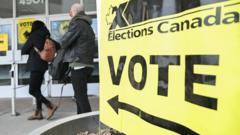In the final hours before voting, Canadians are set to make their choices in a pivotal election that has been dramatically impacted by the actions and rhetoric of U.S. President Donald Trump. The landscape has shifted significantly since the beginning of the year, when the Conservative Party was expected to dominate. However, Trump’s controversial tariffs and comments suggesting Canada could become the "51st state” have stirred a surge of support for Mark Carney's Liberal Party.
Final polling indicates a close race, with the Liberals marginally leading, and Conservative leader Pierre Poilievre expressing his party's confidence in seizing victory. The campaign culminates with a somber backdrop following a tragic car ramming incident in Vancouver that claimed 11 lives, prompting Carney to pause his campaign to address the nation while Poilievre visited the local Filipino community.
The election demonstrates an unusual shift fueled by Trump’s policies, fostering a wave of Canadian nationalism which was evident as hockey fans booed the U.S. national anthem, signaling a rupturing of long-standing bilateral relations. Carney, making the case for a strong and united Canada, has sought to position himself as the leader equipped to navigate the country through Trump's perceived threats. He advocates for solidifying bonds with other allies such as the UK and EU, indicating that the previous era of reliance on the U.S. is over.
Poilievre, on the other hand, is promoting himself as the change candidate, capitalizing on public discontent over issues like heightened living costs and crime during what he describes as a "lost Liberal decade” under former Prime Minister Justin Trudeau. His campaign strategy heavily emphasizes the need for change to address the economic challenges facing Canadians.
As the election draws near, smaller parties like the New Democratic Party (NDP) and the Bloc Québécois are struggling to make significant headway, with the major focus resting on the Conservatives and Liberals. NDP leader Jagmeet Singh, who had been campaigning in Vancouver before the violent incident, underscores the importance of his party’s role as a counterbalance to the mainstream parties.
Historically, Canada has oscillated primarily between Liberal and Conservative governance. Despite Trump's indirect influence on the electoral ambiance, he has refrained from commenting on the election outcome, though some administration officials have echoed sentiments about Canada being a more beneficial asset to the U.S.
Polls will open at 08:30 local time in Newfoundland, advancing through various time zones until closing in British Columbia, with a record 7 million advance ballots already cast, indicating a heightened engagement among Canadian voters.
Final polling indicates a close race, with the Liberals marginally leading, and Conservative leader Pierre Poilievre expressing his party's confidence in seizing victory. The campaign culminates with a somber backdrop following a tragic car ramming incident in Vancouver that claimed 11 lives, prompting Carney to pause his campaign to address the nation while Poilievre visited the local Filipino community.
The election demonstrates an unusual shift fueled by Trump’s policies, fostering a wave of Canadian nationalism which was evident as hockey fans booed the U.S. national anthem, signaling a rupturing of long-standing bilateral relations. Carney, making the case for a strong and united Canada, has sought to position himself as the leader equipped to navigate the country through Trump's perceived threats. He advocates for solidifying bonds with other allies such as the UK and EU, indicating that the previous era of reliance on the U.S. is over.
Poilievre, on the other hand, is promoting himself as the change candidate, capitalizing on public discontent over issues like heightened living costs and crime during what he describes as a "lost Liberal decade” under former Prime Minister Justin Trudeau. His campaign strategy heavily emphasizes the need for change to address the economic challenges facing Canadians.
As the election draws near, smaller parties like the New Democratic Party (NDP) and the Bloc Québécois are struggling to make significant headway, with the major focus resting on the Conservatives and Liberals. NDP leader Jagmeet Singh, who had been campaigning in Vancouver before the violent incident, underscores the importance of his party’s role as a counterbalance to the mainstream parties.
Historically, Canada has oscillated primarily between Liberal and Conservative governance. Despite Trump's indirect influence on the electoral ambiance, he has refrained from commenting on the election outcome, though some administration officials have echoed sentiments about Canada being a more beneficial asset to the U.S.
Polls will open at 08:30 local time in Newfoundland, advancing through various time zones until closing in British Columbia, with a record 7 million advance ballots already cast, indicating a heightened engagement among Canadian voters.






















